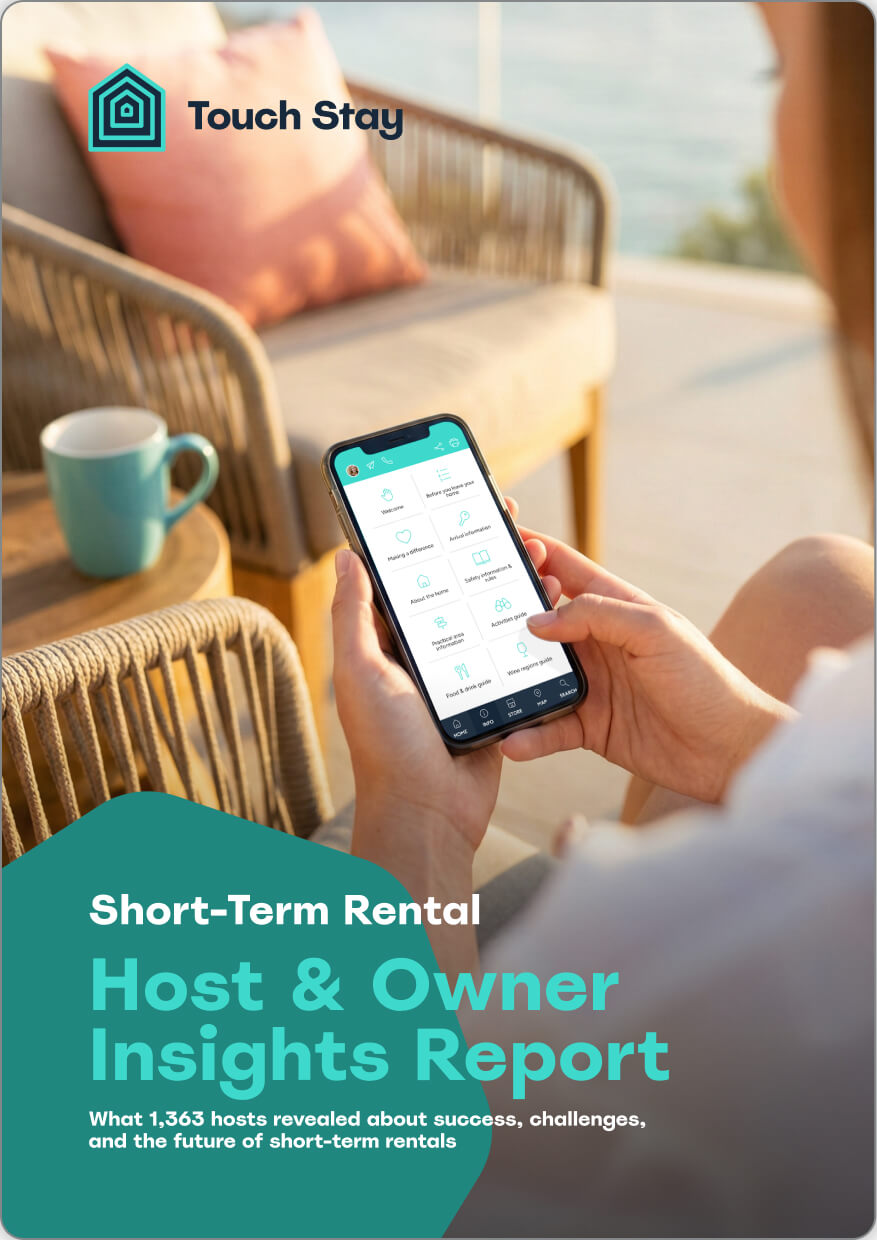Many people prefer the space and comfort of short-term apartments or houses over traditional hotels, giving rise to a variety of vacation rental businesses. Whether you’re occasionally renting out your second home or you manage a few properties across multiple locations, renting out properties is relatively simple and can be managed online or via an app.
Unfortunately, one of the drawbacks that comes with online credit card payments for vacation rentals is managing chargebacks. They can be difficult and time-consuming to fight, but there are useful tactics you can use to prevent and handle them successfully.
Whether you have just a single vacation rental property or three hundred, it’s important to understand chargebacks and how to navigate them. But just in case you’re not familiar, let’s cover what a chargeback actually is.
- What is a chargeback?
- Different types of chargebacks
- Tactics for preventing vacation rental chargebacks
- Prevention is the best approach
What is a chargeback?
You may have done everything to make sure your vacation rental business is providing a great service and turning a profit. You’ve got a great website and a successful marketing campaign. You’ve recruited a talented sales team, and you might even have splashed out on an AI real time coach to support them.
Every transaction is a valuable source of income, which is why it is particularly concerning when you get a chargeback. If you’ve not encountered one before, a chargeback occurs when - for various reasons that we’ll cover in a moment - a cardholder disputes a credit card transaction.
To instigate this, the customer has to get in touch with their bank and request a refund of the payment. The bank then conducts an investigation and can reverse the transaction they paid for their vacation rental and refund the money.

Different types of chargebacks
There are a few different types of chargebacks that you might encounter:
Fraudulent chargebacks
- Unauthorised transactions: this happens when a guest claims they did not authorise or make the payment.
- Stolen credit cards: in the event that a transaction was made using a stolen credit card, a chargeback can be made.
- Attempted fraud: a guest may attempt to avoid payment by falsely claiming that the transaction is fraudulent.
Non-fraudulent chargebacks
- Disputed transactions: in this instance, a guest accepts making the transaction, but they are disputing it for a number of reasons, e.g., incorrect amount.
- Service dissatisfaction: if a guest feels they did not receive the service or experience that they paid for, they may request a chargeback.
- Cancellation disputes: a guest may accept a cancellation policy when booking but, upon cancelling, seek a full refund via a chargeback to dispute fees or a partial refund.
Tactics for preventing and managing vacation rental chargebacks
Though managing chargebacks is a tricky business, these tips will help to both minimise and manage them.
Comprehensive guest screening
A good way to prevent some chargebacks is to get to know your guests with short term rental checks. Take advantage of automated software that screens your guests to flag any potential risks, such as peculiar booking patterns that might suggest fraudulent activity.
Guest ID should be verified alongside credit card details so you can pick up any inconsistencies at the point of payment. Any repeated attempts to use multiple payment methods should be carefully monitored.
Keep revisiting your screening methods and make use of any improvements in technology where possible. This will help to keep you protected from fraudulent chargebacks.

Strict agreements
Draft ironclad agreements that detail the full terms and conditions of the rental, including rental duration, deposit, payment schedules, and any other information that needs to be clarified.
If you have guests that potentially pose a higher risk, such as students, you can also impose co-signing agreements. This means that in the event of any issues, there is another party also responsible for any losses.
Clarify non-refundable fees, such as cleaning or service fees, and have guests confirm in writing that they agree to pay them. Finally, make sure all agreements adhere to local laws and regulations. This will protect you in the event of any chargebacks, as you’ll have a clear paper trail of what the guests agreed to.
Proactive communication and responsiveness
Communication channels should be clear and easily accessible. Offer multiple contact options and make sure any enquiries are handled promptly. This is particularly important for any issues that come up.
A clear policy for issue resolution times can make sure that no situation is allowed to drag on too long. Solving problems quickly can prevent them from escalating, which can cause guests to become dissatisfied with their experience and potentially lead to a chargeback.
Thorough documentation and record-keeping
Whether you’re confirming payment or emailing a guest a local area guide, you should maintain digital records of all communications diligently. Anything that is discussed over the phone should preferably be recorded (with their knowledge and consent).
Otherwise, take care that you confirm everything again by email, text message, or mail. Guest data, such as payment details and ID verifications, should also be stored securely so you have evidence that you did due diligence to ensure that the payment card holder made the booking.
In the event of a chargeback, thorough documentation means you will be able to clearly prove that a customer provided ID and payment details, agreed to rental terms, received check-in instructions, and any other pertinent information.
To ensure the highest level of security and compliance, consider partnering with a HIPAA compliant VoIP service for your guest communications.

Transparent house rules and cancellation policies
Any property listings should include house rules, as should your pre-arrival communications, and it’s a good idea to display them clearly in the property as well—basically, cover all the bases.
Cancellation policies should be clearly outlined on listings, and it is a requirement that they acknowledge and accept the policy at the point of booking. This prevents a customer from claiming that house rules or cancellation policies were in any way not clear or agreed to.
Accurate property description and presentation
An honest presentation of rental properties is good for both your business and your customers. For starters, make sure you have a local registered URL. Domains that are specific to the country you do business in provide legitimacy and customer trust.
That helps to assure customers that your business is trustworthy and your rental property descriptions are accurate. Display lots of photos, highlight all the amenities and be truthful about any limitations or potential issues, e.g., a lot of stairs making it unsuitable for people with mobility issues. Managing guest expectations this way minimises the chance of chargebacks.
Seamless check-in procedures
Due to flights or travel disruption, guests may arrive at any time of the day. Put in place check-in procedures that you trust will go smoothly, even if there isn’t a person present to facilitate the proceedings.
An automated digital check-in system will guide your guests through the check-in steps so they have all the information they need. Keyless entry or keycode systems prevent problems with lost keys or sticky locks.
Provide round-the-clock support so that in the case of an emergency, there is someone guests can reach out to. Problems with check-ins can, in the worst-case scenario, leave people stranded outside the property. This can lead to chargebacks, so do everything possible to avoid such a situation.

Exceeding guest expectations
It goes without saying that in your vacation rental email marketing and adverts, you’ll be portraying your properties and services in the best possible light. So, when guests book your properties, they will arrive with certain expectations.
Take great care to provide the experience that they have been promised and more. Include thoughtful extras that are tailored to the guests. Is a family coming to stay? Then you could provide some games or toys.
Or, if it’s a couple taking a trip for their anniversary, you could give them a bottle of champagne or some flowers. More practical touches can also go down well, such as some basic groceries on their arrival. All this can prevent disputes over payment and fees and, therefore, chargebacks.
Partner with property management services
Suppose handling your vacation rentals has become too hectic, and you’ve found yourself working around the clock and Googling “what is a digital contact centre” as you try to find new ways to handle all the enquiries. In that case, the chances are you’ll potentially get more chargebacks as well.
To take some of the load off your hands and take advantage of industry expertise, consider collaborating with a professional property management firm. These companies can handle all guest enquiries, bookings, and the whole of a guest’s stay from check-in to check-out.
They are also well-equipped to handle any chargebacks. With established procedures, experience, and knowledge of rental laws, they are able to provide a strong case and clear evidence to dispute any chargebacks that come through. 
Prevention is the best approach
The best way to deal with chargebacks is to do everything possible to minimise them before they happen. Stringent guest screening procedures, along with strict payment verification, can prevent a fraudulent transaction that then results in a chargeback.
Comprehensive documentation of all communications, transactions, and agreements will deter guests from claiming a chargeback on the basis of cancellation or fee dispute—and if they still do, you have all the evidence to support you.
Plan for every eventuality so that your guests have an excellent experience and any problems are dealt with swiftly. When your guests are happy and enjoy their stay, they are unlikely to claim chargebacks on the basis of a substandard service.
Some chargebacks are inevitable. However, if you follow the tactics above, you should be able to handle the dispute with the credit card company, confident that you did everything in your power to manage your vacation rental properties correctly.
Avoid chargebacks by ensuring a seamless guest experience with a Touch Stay digital guidebook. Start your 14-day free trial today

Ned
Ned has clocked up over 11 years in digital marketing and comms, with a strong focus on creating engaging content for a range of brands and agencies. When he’s not writing, he can be found digging for records, peering through his telescope at the night sky, or onboard his local lifeboat where he volunteers as a crewmember.
Be the first to know!
Join our newsletter for early access to:
- ✅ Free guides
- ✅ Pro tips & tricks
- ✅ Time saving tutorials
- ✅ Latest blog posts
- ✅ Checklists & templates





















.webp?width=50)
%20and%20how%20to%20calculate%20it.webp?width=50)